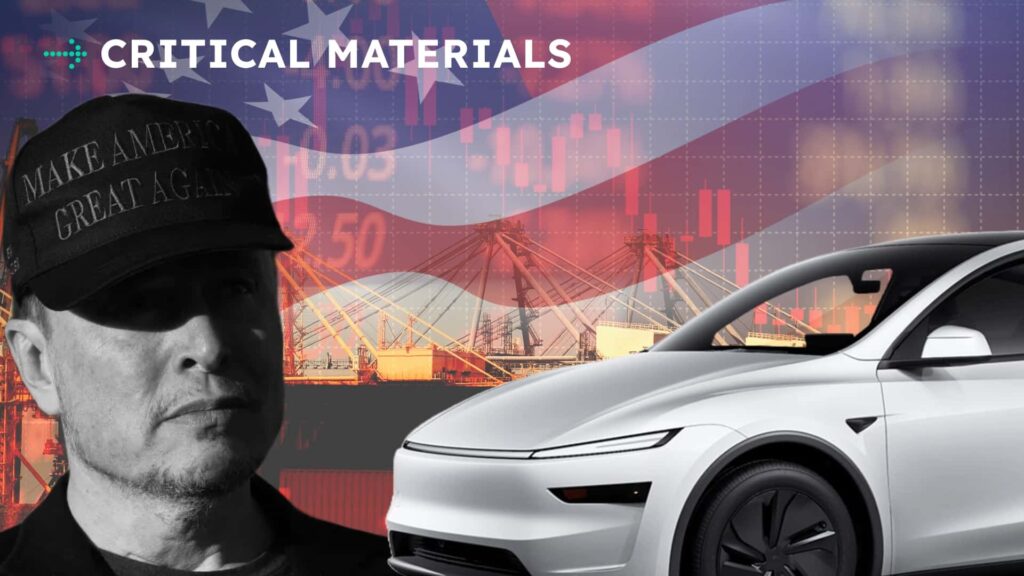The Trump administration’s rapid-fire tariffs and tariff threats have left every car company on edge, with potential price increases for new cars looming on the horizon. The uncertainty surrounding tariffs has made it challenging for automakers to plan for the future and make crucial business decisions.
Even Tesla, which was thought to be less impacted by tariffs due to its high level of US manufacturing, is now feeling the pinch. Despite CEO Elon Musk’s close relationship with President Trump, the electric car manufacturer is warning of potential challenges ahead.
This Friday edition of Critical Materials delves into the impact of tariffs on the automotive industry. The Volkswagen Group’s Cupra brand is set to launch in the US despite tariffs, while BMW is facing scrutiny in China.
Tesla, known for its US-made cars, is now facing the reality of tariffs on imported goods. The company recently sent a letter to US trade representative Jamieson Greer, expressing concerns about the disproportionate impacts of tariffs on US exporters. The letter highlighted how past trade actions have led to increased tariffs on electric vehicles imported into other countries, affecting Tesla’s global operations.
The Financial Times reported on Tesla’s proactive stance on the issue, with the company advocating for fair trade while acknowledging the challenges posed by the current tariff regime. The letter, dated March 11, emphasized the need for a more balanced approach to trade policies to avoid negative repercussions for American exporters.
Despite being one of the most US-made car options available, Tesla is not immune to the effects of global trade tensions. The company’s efforts to navigate the uncertain terrain of tariffs underscore the complexities facing the automotive industry in an increasingly interconnected world. As the industry grapples with the fallout from trade disputes, automakers like Tesla are left to navigate a challenging landscape where uncertainty reigns supreme. The ongoing trade war between the United States and various other countries has put many industries in a tough spot, and the automotive sector is no exception. With the Trump administration threatening to impose additional tariffs on European cars, companies like Tesla and Volkswagen are closely monitoring the situation to see how it will impact their businesses.
For Tesla, the potential increase in tariffs could not come at a worse time. The electric car manufacturer is already facing challenges in terms of production and sales, and any additional costs associated with exporting its vehicles could further hinder its ability to make a profit. With Elon Musk’s company desperately needing to make sales, the last thing it needs is more obstacles in its way.
On the other hand, Volkswagen is moving forward with its plans to bring its Cupra brand to the U.S. market, despite the tariff concerns. The European automaker sees the American market as a key area for growth, especially as its sales in China and Europe continue to decline. By introducing the stylish and performance-focused Cupra EVs to younger and wealthier buyers in the U.S., Volkswagen hopes to revitalize its presence in the country.
While the threat of tariffs looms large, Cupra’s CEO Wayne Griffiths remains confident in the brand’s ability to enter the U.S. market by 2030. Griffiths emphasized that the decision to bring Cupra to the U.S. is a long-term one that cannot be swayed by short-term fluctuations in trade policies. Despite the potential challenges posed by tariffs, Cupra is committed to offering both electric and gas-powered vehicles in the U.S. market to meet consumer preferences and market demands.
As the automotive industry braces for potential changes in trade policies, the battle between tariffs and business interests will continue to play out. Whether the Trump administration will prioritize tariffs or the success of companies like Tesla and Volkswagen remains to be seen. In the meantime, industry watchers are eagerly anticipating how this high-stakes showdown will unfold. The sharp lines and sporty designs always caught my eye, so I was excited to see that Cupra might be considering a foray into the U.S. market. The brand, which was originally a performance division of Seat before becoming its own separate entity, has been gaining traction in Europe with models like the Cupra Ateca and the Cupra Leon.
With the growing interest in electric vehicles and performance-oriented cars in the U.S., it seems like the perfect time for Cupra to make its debut. The brand has already showcased its electric capabilities with the Cupra Tavascan concept, a sleek and powerful electric SUV that could certainly turn heads on American roads.
However, breaking into the U.S. market is no easy feat, especially for a brand that is relatively unknown in the country. Cupra would need to invest heavily in marketing and distribution to make a splash in a competitive market dominated by established players like BMW, Audi, and Mercedes-Benz.
But if Cupra can maintain its reputation for stylish design and performance-oriented vehicles, there’s a good chance that it could carve out a niche for itself in the U.S. market. With the right strategy and a strong product lineup, Cupra could definitely be a hit among American consumers who are looking for something a little different from the traditional luxury brands.
Overall, it’s an exciting prospect to think about Cupra making its mark in the U.S. If the brand can bring its unique blend of style, performance, and electric technology to American shores, it could definitely shake up the competitive landscape and give consumers some much-needed variety in the luxury car market.

